SPACE4GEO: the Large-Scale Partnership on Space Data, Services and Applications: Perspectives on Sector Skills Strategy

The SPACE4GEO Large Scale Partnership has been officially launched! In the frame of the Paris Air Show, the European Commission’ Directorate General for Defence Industry and Space (DG DEFIS), organised a dedicated event including a roundtable of experts to celebrate the official launch of SPACE4GEO as well as the European Year of Skills.
The European Year of Skills is a European Commission initiative established to spark the discussion and bring on the spotlight the role played by skills in modern digital societies. The Initiative aims to help people getting the right tools to develop the right skills for quality jobs and to support companies to address skills shortages in the EU. Throughout this year, multiple skills development opportunities and activities across Europe will be organised to improve the recognition of qualifications across borders, to bring organisations and people together setting how EU initiatives and funding possibilities can enable the skills development. In this context, Large-scale Skills Partnerships (LSP) represent the concrete implementation of the Pact for Skills for Europe. The Pact for Skills aims to support public and private organisations with upskilling and reskilling to support their green and digital transitions.
Among the many sectoral LSPs established this year, it is possible to count also the Space4GEO LSP, officially launched by the EU Commission on 25 April 2023. It aims to empower workers with the skills needed to access the space downstream and geo-information sector and to achieve the goals set for the main EU’s policies, namely the European Green Deal, the European Digital Strategy, the European Pillar of Social Rights, the Space Strategy for Europe and the recent Space Strategy for Security and Defence. The roundtable held in Paris was the occasion to introduce the goals of the LSP and discuss on the challenges related to the upskilling and reskilling of future and current workforce in the space sector. In this occasion, Milva Carbonaro- CEO of GISIG Association and SPACE4GEO Coordinator- retraced the path that led from EO4GEO project to the Space4GEO LSP.
The EO4GEO project (2018-2022) was an Erasmus+ Sector Skills Alliance promoted in the framework of the Blueprint for Sectoral Cooperation on Skills (introduced by the Skills Agenda for Europe 2016) aiming to bridge the skills gap between the supply and demand of education and training in the space geoinformation sector, promoting the uptake and integration of space/geospatial data and services in a broad range of domains. Leveraging on its results and in order to ensure the sustainability of the project’s results beyond the funding period, the partners committed to continue implementing the Sectors Skills Strategy, establishing the EO4GEO Alliance. The Alliance intends to maintain, enhance and implement the EO4GEO project results, while engaging its members in new initiatives and projects to achieve the Strategic Objectives of the EO4GEO Sector Skills Strategy. The Alliance soon evolved in the new LSP on Space Data, Services and Applications-Space4GEO. This new LSP is complementary with the existing LSP on Aerospace and Defence and with those LSPs representing the other vertical sectors, which could benefit from the provision of space-related data and services maximising their impacts when coupled with ICT and other tech sectors.
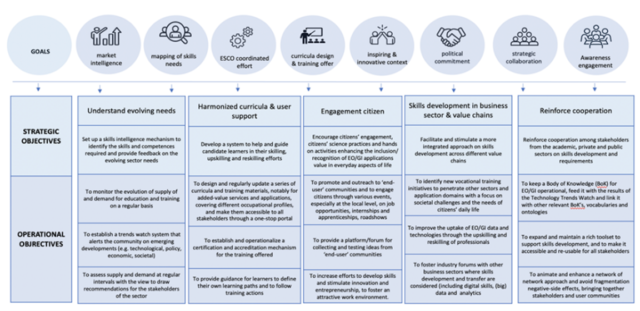
Figure 1. The Strategic Objectives of the Sector Skills Strategy for space geoinformation
The core objectives of the Sector Skills Strategy expand the focus to include the broad space downstream ecosystem beyond EO and geo-information including PNT, satellite communications, and certain soft skills needed to implement future policies. The expectation is to attract new talents to apply for jobs in a steadily growing sector.
Currently, the Space4GEO LSP around 50 members from 14 countries among public administrations, Higher Education institutions, Vocational education and training (VET) providers, commercial companies, research centres and sectoral associations. It is open to all key stakeholders in this sector and beyond.
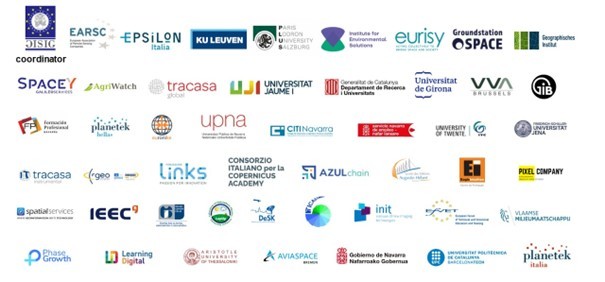
Figure 2. Members of the SPACE4GEO Large Scale Partnership
The LSP aims at understanding the evolving needs of the sector, setting up a permanent observatory of skills needs and trying to anticipate future trends according to societal, economic and technological changes/challenges. The objective is to develop harmonised educational curricula to support users and establish a one-stop shop portal to guide students and teachers in their skilling, reskilling, and upskilling efforts. The LPS also aspires at developing skills in the business sector and value chain of other domains. It responds to the needs of attracting talents and raise awareness about the opportunities provided by the space sector.
LSP’s participating stakeholders commit to ensure continuous exchange and cooperation, establish and deliver a shared understanding of the volume of skills needed and capacity requirement desirable to achieve the high-level vision of a successful space downstream and geoinformation sector.
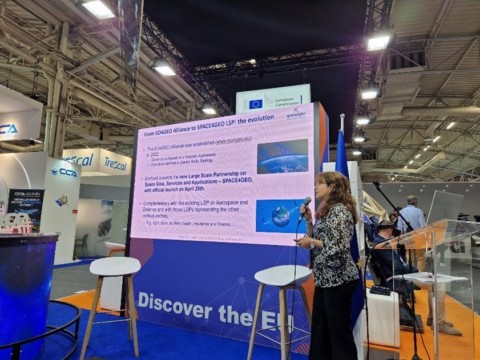 Today, also public authorities are struggling in finding talents to cover open job positions, especially concerning specific roles related to STEAM like IT experts, imagery analysts, to mention few. The aging factor of European society is rapidly transforming the current growing demand in an actual urgence soon. This becomes clear when it comes to the space sector where, according to the “Space industry workforce” report from Eurospace, the average age of the people employed- especially in the upstream- is 50 years old. It means that there will be a generation change over the next 10-15 years. In this respect, the need of upskilling and reskilling of personnel becomes crucial to cover the future demands.
Today, also public authorities are struggling in finding talents to cover open job positions, especially concerning specific roles related to STEAM like IT experts, imagery analysts, to mention few. The aging factor of European society is rapidly transforming the current growing demand in an actual urgence soon. This becomes clear when it comes to the space sector where, according to the “Space industry workforce” report from Eurospace, the average age of the people employed- especially in the upstream- is 50 years old. It means that there will be a generation change over the next 10-15 years. In this respect, the need of upskilling and reskilling of personnel becomes crucial to cover the future demands.
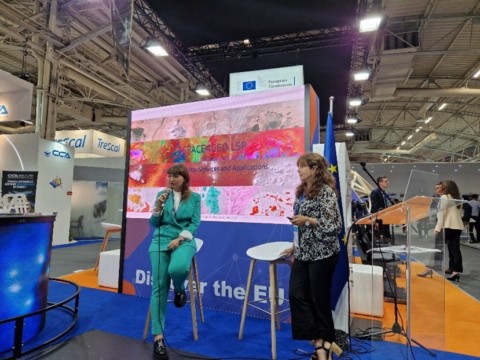
During the launch event, a relevant point of discussion consisted in understanding how the strategy on skills development can be implemented. The panel participants- Nicolas Heitz (Exotrail), Jean Daniel Testé (Aerospace Lab), Danny Vandenbroucke (KU Leuven) and Annalisa Donati (Eurisy)- represented the multiple voices of space stakeholders’ part of the LSP. They exchanged on the industrial perspective and skills availability. What emerged is that business-academia relations are functional to support students accessing the working environment for the first time as well as young professionals to allow them for upskilling. It is important to highlight that the gap between the needs of the job space market and the existing expertise is something real, recognised at national level and stressed in national space strategies. Eurisy, founding member of the Space4GEO Alliance and a European association of European space agencies, aims at supporting and compiling the training courses that can be then brought back to the agencies and used by national actors. The KU Leuven, founding partner of the Space4GEO Alliance and LSP, stresses that there is a need to change the teaching methodology introducing innovative techniques- gamification, problem- and case-based learning- to stimulate curiosity and generate awareness around STEAM subjects starting from secondary high schools.

Citizens’ science has been mentioned as a potentially relevant element to co-design upskilling and reskilling strategies, especially for the teachers themselves. Already through Space4GEO, partners will have the opportunity to exchange experiences, access to educational resources and design a common strategy to support upskilling and reskilling.
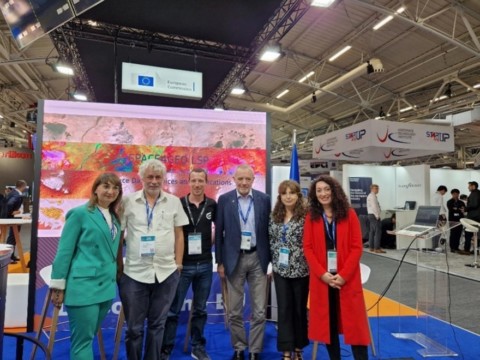
The kick-off event of the Space4GEO LSP was the occasion to discuss about the importance of building skills since a very young age-starting from primary and secondary school- leveraging on the inspirational power of space to attract new generation and stimulate their curiosity to purse their academic path in the many different areas necessary for a healthy space sector. In this process also parents should be involved as citizens to provide them the right tools to generate awareness about the space and its potential, through dedicated classes or courses to show its multidisciplinary aspect and the relevance of space to address many big challenges including climate change.
The Space4GEO LSP will focus on the space downstream sector, knowing that space-derived applications cannot exist without qualified personnel in the upstream sector.
